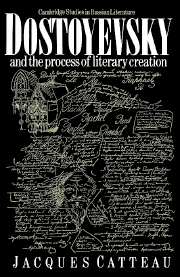Book contents
- Frontmatter
- Contents
- Preface to the English edition
- List of abbreviations
- General editor's note on transliteration and references
- General introduction
- PART I The creative environment
- Introduction
- 1 Forms of creativity in embryo
- 2 The heritage
- 3 The heritage: literature
- 4 The heritage: history and philosophy
- 5 Illness
- 6 Money
- PART II The process of creation
- Part III Time and space in the world of the novels
- Conclusion
- Notes
- Select bibliography
- Index of names
6 - Money
Published online by Cambridge University Press: 18 December 2009
- Frontmatter
- Contents
- Preface to the English edition
- List of abbreviations
- General editor's note on transliteration and references
- General introduction
- PART I The creative environment
- Introduction
- 1 Forms of creativity in embryo
- 2 The heritage
- 3 The heritage: literature
- 4 The heritage: history and philosophy
- 5 Illness
- 6 Money
- PART II The process of creation
- Part III Time and space in the world of the novels
- Conclusion
- Notes
- Select bibliography
- Index of names
Summary
Superfluous money is much more important to me than necessary money.
Trishatov in A Raw Youth.Next to epilepsy, money is the ruling power in Dostoyevsky's creative environment. No writer has spent more time asking for money and no writer has hated money so much. The attitude of Dostoyevsky and his characters towards it is a perfect illustration of the tragic dialectic of desire: between creator and created there is only a difference of dramatisation. Money and Dostoyevsky, money in Dostoyevsky's works are themes which have been exhaustively researched, so we shall give only a rapid summary. Two points deserve closer analysis: the part played in the act of creation by the need for money, so far nimbly eluded by critics, who see it only as a motivation, and the part money plays in the novels to reveal the human mystery.
Thirst for money
From his youth to the eve of his death, 26 January 1881, when he begged his editor to send him 400 roubles, Dostoyevsky, as his letters show, never stopped asking for money. He had a complete repertory of approaches: from a timid request to his father while he was a student, for money to buy boots, a chest and his own tea, to an insolent and violent attempt to obtain 1,000 silver roubles from his guardian, P. A. Karepin, in return for giving up part of his inheritance.
- Type
- Chapter
- Information
- Dostoyevsky and the Process of Literary Creation , pp. 135 - 168Publisher: Cambridge University PressPrint publication year: 1989



